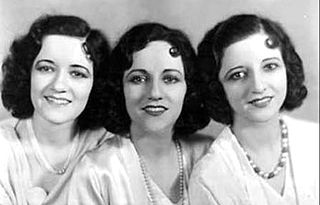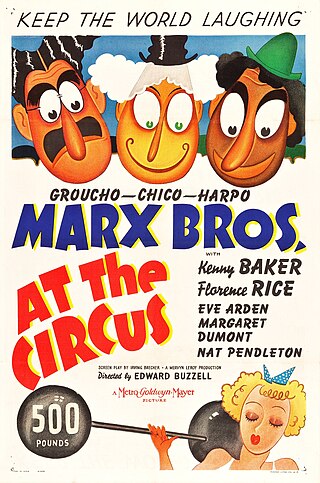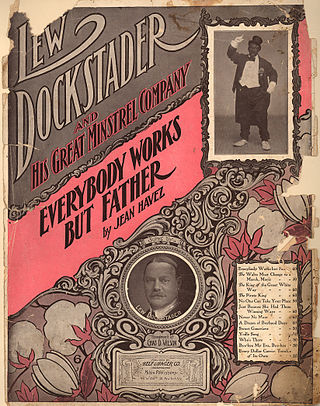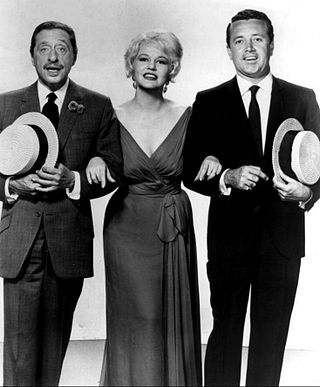
Julius Henry "Groucho" Marx was an American comedian, actor, writer, and singer who performed in film and vaudeville and on television, radio, and the stage. He was a master of quick wit and is considered one of America's greatest comedians.

The Marx Brothers were an American family comedy act that was successful in vaudeville, on Broadway, and in 14 motion pictures from 1905 to 1949. Five of the Marx Brothers' fourteen feature films were selected by the American Film Institute (AFI) as among the top 100 comedy films, with two of them, Duck Soup (1933) and A Night at the Opera (1935), in the top fifteen. They are widely considered by critics, scholars and fans to be among the greatest and most influential comedians of the 20th century. The brothers were included in AFI's 100 Years... 100 Stars list of the 25 greatest male stars of Classical Hollywood cinema, the only performers to be included collectively.

A Night at the Opera is a 1935 American comedy film starring the Marx Brothers, and featuring Kitty Carlisle, Allan Jones, Margaret Dumont, Sig Ruman, and Walter Woolf King. It was the first of five films the Marx Brothers made under contract for Metro-Goldwyn-Mayer after their departure from Paramount Pictures, and the first after Zeppo left the act. The film was written by George S. Kaufman and Morrie Ryskind from a story by James Kevin McGuinness, with additional uncredited dialogue by Al Boasberg. The film was directed by Sam Wood. One of MGM's biggest hits at the 1935 box office, A Night at the Opera was selected in 1993 for preservation in the National Film Registry by the Library of Congress as being "culturally, historically, or aesthetically significant". It is also included in the 2007 update of AFI's 100 Years... 100 Movies, at number 85; and previously in AFI's 100 Years...100 Laughs 2000 showing, at number 12.

Lester Raymond Brown was an American jazz musician who led the big band Les Brown and His Band of Renown for over six decades from 1938 to 2000.

Leonard Joseph "Chico" Marx was an American comedian, actor and pianist. He was the oldest brother in the Marx Brothers comedy troupe, alongside his brothers Arthur ("Harpo"), Julius ("Groucho"), Milton ("Gummo") and Herbert ("Zeppo"). His persona in the act was that of a charming, uneducated but crafty con artist, seemingly of rural Italian origin, who wore shabby clothes and sported a curly-haired wig and Tyrolean hat. On screen, Chico is often in alliance with Harpo, usually as partners in crime, and is also frequently seen trying to con or outfox Groucho. Leonard was the oldest of the Marx Brothers to live past early childhood, the first-born being Manfred Marx who had died in infancy. In addition to his work as a performer, he played an important role in the management and development of the act in its early years.

The Boswell Sisters were an American close harmony singing trio of the jazz and swing eras, consisting of three sisters: Martha Boswell, Connie Boswell, and Helvetia "Vet" Boswell. Hailing from uptown New Orleans, the group blended intricate harmonies and song arrangements featuring effects such as scat, instrumental imitation, ‘Boswellese’ gibberish, tempo and meter changes, major/minor juxtaposition, key changes, and incorporation of sections from other songs. They attained national prominence in the United States in the 1930s during the twilight of the Jazz Age and the onset of the Great Depression.

Margaret Dumont was an American stage and film actress. She is best remembered as the comic foil to the Marx Brothers in seven of their films; Groucho Marx called her "practically the fifth Marx brother."

At the Circus is a 1939 comedy film starring the Marx Brothers released by Metro-Goldwyn-Mayer in which they help save a circus from bankruptcy. The film contains Groucho Marx's classic rendition of "Lydia the Tattooed Lady". The supporting cast includes Florence Rice, Kenny Baker, Margaret Dumont, and Eve Arden. The songs, including "Lydia the Tattooed Lady", "Two Blind Loves", and "Step Up and Take a Bow", were written by the team of Harold Arlen and Yip Harburg, who'd recently furnished the songs for another MGM film that same year, The Wizard of Oz.

You Bet Your Life is an American comedy quiz series that has aired on both radio and television. The original version was hosted by Groucho Marx of the Marx Brothers, with announcer and assistant George Fenneman. The show debuted on ABC Radio on October 27, 1947, moved to CBS Radio debuting October 5, 1949, and went to NBC-TV and NBC Radio on October 4, 1950. Because of its simple format, it was possible to broadcast the show on both radio and television but not simultaneously. Many of the laughs on the television show were evoked by Groucho's facial reactions and other visual gimmicks; the two versions were slightly different. The last episode in a radio format aired on June 10, 1960. The series continued on television for another year, recording a season on September 22, 1960 with a new title, The Groucho Show.
Flywheel, Shyster, and Flywheel is a situation comedy radio show starring two of the Marx Brothers, Groucho and Chico, and written primarily by Nat Perrin and Arthur Sheekman. The series was originally broadcast in the United States on the National Broadcasting Company's Blue Network, beginning on November 28, 1932, and ending on May 22, 1933. Sponsored by the Standard Oil Companies of New Jersey, Pennsylvania and Louisiana and the Colonial Beacon Oil Company, it was the Monday night installment of the Five-Star Theater, an old-time radio variety series that offered a different program each weeknight. Episodes were broadcast live from NBC's WJZ station in New York City and later from a sound stage at RKO Pictures in Los Angeles, California, before returning to WJZ for the final episodes.

The Mad, Mad, Mad Comedians is a 1970 American animated television special produced by Rankin/Bass Productions. After the Christmas special Frosty the Snowman (1969), it was Rankin/Bass' second hand-drawn animated work to be outsourced to Osamu Tezuka's Mushi Production in Tokyo, Japan. The show aired on ABC on April 7, 1970 before the airing of that year's Oscars. It was a tribute to early vaudeville, and featured animated reworkings of various famous comedians' acts.

Constance Foore "Connee" Boswell was an American vocalist born in Kansas City, Missouri but raised in New Orleans, Louisiana. With sisters Martha and Helvetia "Vet", she performed in the 1920s and 1930s as the trio The Boswell Sisters. They started as instrumentalists but became a highly influential singing group via their recordings and film and television appearances.

Melinda Marie Marx is an American former actress, singer, and musician who had a brief movie career. She is the daughter and only living child of Groucho Marx and his second wife, Kay Marvis Gorcey.
"I Let a Song Go Out of My Heart" is a 1938 composition by Duke Ellington, with lyrics added by Irving Mills, Henry Nemo and John Redmond. The song became a number one hit for Ellington in 1938. Other hit versions the same year were by Benny Goodman, Connee Boswell, Hot Lips Page, and Mildred Bailey. It was performed as part of The Cotton Club Parade of 1938.

Sunday Night at the Trocadero is a 1937 short film directed by George Sidney. It appears as a special feature on the DVD version of the Marx Brothers' A Night at the Opera.

Martha Foore Boswell Lloyd was an American jazz singer and pianist, and the eldest of the vocal trio the Boswell Sisters. Her younger sisters were Connee and Helvetia "Vet" Boswell.

"Everybody Works but Father" is a popular song published in 1905, with words and music by Jean Havez. It is sung from the point of view of the son, lamenting that he, his sister and his mother all work, while his father lounges all day: "Everybody works at our house but my old man." The song was introduced and recorded by blackface performer Lew Dockstader.
An Evening With Groucho is the title of a 1972 compilation recording of the one-man show by American comedian Groucho Marx, edited from three separate performances: New York City's Carnegie Hall, C.Y. Stephens Auditorium at Iowa State University, and Masonic Auditorium in San Francisco, California. With the Carnegie Hall show's introduction by Dick Cavett, the resulting performances were released as a double album by A&M Records. Marx shared family and show business stories and performed songs from Marx Brothers stage shows and movies. Marvin Hamlisch performed an opening overture and accompanied Groucho on the piano. A numbered, limited edition edited single picture disc edition was released in 1978, and a compact disc version was later briefly available.

The DuPont Show of the Week is an American television anthology drama series that aired on NBC from September 17, 1961 to September 6, 1964. During its time on the air, the program "was NBC's late Sunday evening 'class' showcase".

Here's Johnny: Magic Moments from the Tonight Show is a live double album commemorating 25 years of The Tonight Show, released by Casablanca Records in 1974. The album features an array of performers with never before available performances on record. The album included a 25th anniversary poster summarizing the history of the show.